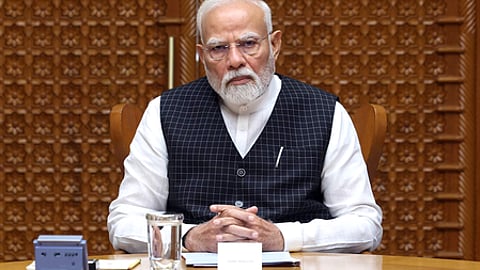India ranks 151 in World Press Freedom Index, report raises alarm over media monopoly
India has risen to rank 151 out of 180 in the World Press Freedom Index 2025. The report, put together by Reporters Without Borders (RWB), an international non-profit organisation for democratic governance, raised alarm about economic pressure being a pressing concern for most media outlets worldwide. India ranked 159 in 2024.
“The economic indicator in the 2025 RSF World Press Freedom Index is at its lowest point in history, and the global situation is now considered 'difficult’,” said the RSF report. It further cited that serious funding cuts are an additional blow to the media economy, which is already weakened by the dominance that tech giants such as Google, Apple, Facebook, Amazon and Microsoft have over the dissemination of information.
“These largely unregulated platforms are absorbing an ever-growing share of advertising revenues that would usually support journalism,” the report stated. It also added that in 42 countries — harbouring over half of the world’s population— the situation is classified as “very serious.” In these zones, the report cited that press freedom is entirely absent, and practising journalism is particularly dangerous.
The Index ranks Eritrea at the bottom-most and Norway in the first position. The countries that rank below India include Bhutan, Pakistan, Turkey, Palestine, China, Russia, Afghanistan, Syria, and North Korea.
India, ranked at 151, has been sliding over the past years, falling from 140 in 2019 to 142 in 2020 and 2021, and further down to 150 in 2022 and 161 in 2023. India’s neighbouring Pakistan fell to 158 from 150 in 2023 and 157 in 2022.
The report said that in many countries, including India, the concentration of media ownership in the hands of political magnates threatens media plurality and consolidates control in a few hands. In Lebanon (132), India, Armenia (34) and Bulgaria (70), many outlets owe their survival to conditional financing from individuals close to the political or business worlds, the report noted.
One-party regimes and dictatorships feature below India: North Korea (179), China (178), Vietnam (1730, Myanmar (169).
“In China and Vietnam, outlets are either state-owned or controlled by groups closely tied to the countries’ respective Communist parties, and the only independent reporting comes from freelance journalists who mainly operate underground, working under constant threat and with no financial stability. Meanwhile, foreign outlets can find themselves blacklisted at any given moment,” the report said.
According to data collected by RSF for the Index, in 160 out of the 180 countries assessed, media outlets achieve financial stability “with difficulty” — or “not at all.” The report warned that news outlets are shutting down due to economic hardship in nearly a third of countries globally, including the United States (ranked 57), Tunisia (ranked 129), and Argentina (ranked 87).
In the United States, which fell by two points from its previous ranking, the report cited a drop in economic indicators by more than 14 points in two years. An RSF survey in Arizona, Florida, Nevada, and Pennsylvania showed that local journalism is bearing the brunt of the economic downturn, and that it is “difficult to earn a living wage as a journalist.” President Donald Trump’s second term has already intensified this trend as false economic pretexts are used to bring the press into line, the report said.
This has led to the abrupt end to funding for the US RSF Agency for Global Media (USAGM), as well as the US Agency for International Development (USAID), throwing hundreds of news outlets into a critical state of economic instability and forcing some to shut down, particularly in Ukraine (ranked 62).
The Middle East-North Africa region, the report cited, remains the most dangerous in the world for journalists, harbouring the mass destruction of journalism in Gaza by the Israeli army. “Every country in the region is in a ‘difficult' or 'very serious' press freedom situation, except Qatar ( ranked 79). The press is caught between crackdowns from authoritarian regimes and persistent economic precariousness,” the report observed.
In Palestine, ranked at 163, the report said that the situation is “disastrous”. “In Gaza, the Israeli army has destroyed newsrooms, killed nearly 200 journalists and imposed a total blockade on the strip for over 18 months. In Haiti (ranked 112), the lack of political stability has also plunged the media economy into chaos,” the report stated.
Even relatively well-ranked countries such as South Africa (27) and New Zealand (16) are not immune to such challenges, the report noted. It also said that 34 countries stand out for the mass closures of their media outlets, leading to the exile of journalists in recent years. This is especially true in Nicaragua ( ranked 172), Belarus (ranked 166), Iran (ranked 176), Myanmar, Sudan (ranked 156), Azerbaijan (ranked 167) and Afghanistan (ranked 17), where economic difficulties compound the effects of political pressure.

